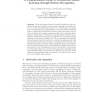Free Online Productivity Tools
i2Speak
i2Symbol
i2OCR
iTex2Img
iWeb2Print
iWeb2Shot
i2Type
iPdf2Split
iPdf2Merge
i2Bopomofo
i2Arabic
i2Style
i2Image
i2PDF
iLatex2Rtf
Sci2ools
101
click to vote
ITS
2010
Springer
2010
Springer
A Computational Model of Accelerated Future Learning through Feature Recognition
Accelerated future learning, in which learning proceeds more effectively and more rapidly because of prior learning, is considered to be one of the most interesting measures of robust learning. A growing body of studies have demonstrated that some instructional treatments lead to accelerated future learning. However, little study has focused on under- standing the learning mechanisms that yield accelerated future learning. In this paper, we present a computational model that demonstrates accelerated future learning through the use of machine learning techniques for feature recognition. In order to understand the behavior of the proposed model, we conducted a controlled simulation study with four alternative versions of the model to investigate how both better prior knowledge learning and better learning strategies might independently yield accelerated future learning. We measured the learning outcomes of the models by rate of learning and the fit to the pattern of errors made by real...
Related Content
| Added | 19 Jul 2010 |
| Updated | 19 Jul 2010 |
| Type | Conference |
| Year | 2010 |
| Where | ITS |
| Authors | Nan Li, William W. Cohen, Kenneth R. Koedinger |
Comments (0)

